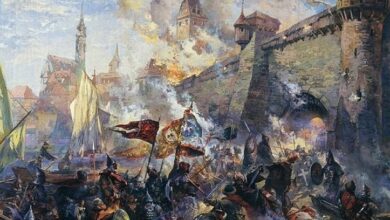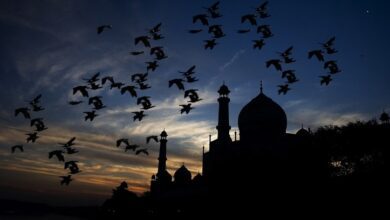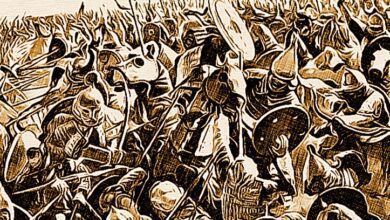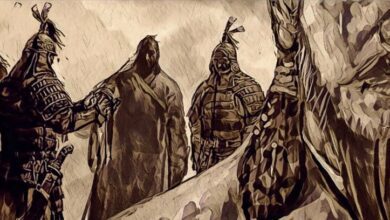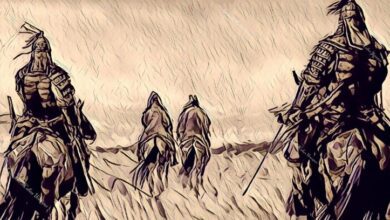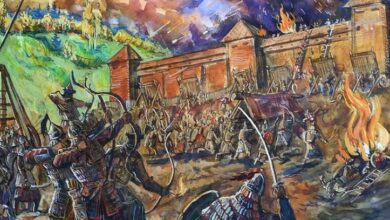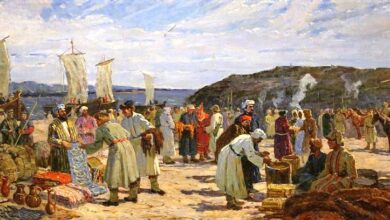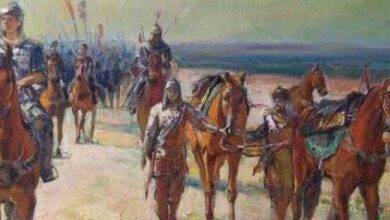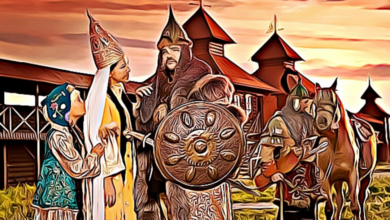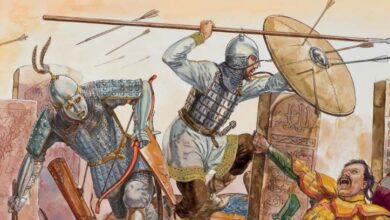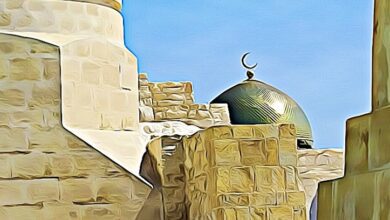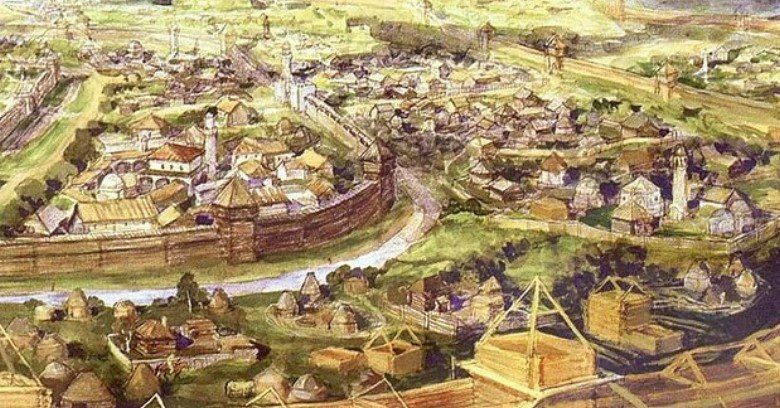
Ghazi Baraj Tarihi. Chapter 5: The city of Bolgar becomes the capital of Bulgar
PAfter the death of Aidar, the ghazis raised his eldest son, the Muslim Gabdulla Djilki, to the Khakan throne. The younger brother of Djilka Lachyn, who did not part with superstitions, and some infidels of the Kara-Bulgar were dissatisfied with this and began to think about a rebellion. Having learned about this, the Khazar bek Ilyas began to incite Manas to interfere in the Bulgarian affairs, but he refused in every possible way because of his dislike for wars and bloodshed in general. For three years, the bek tried to push both powers, but to no avail.
Then, in 858, the Jewish Khazars, led by him, slaughtered the khakan at night in a tent during a roam, and the Kara-Bulgar merchants accused of this, who were going through the Khazar possessions to Dima-Tarkhan, were immediately executed.
Following this, Ilyas appointed his obedient son Manas Ishak, nicknamed Aksak Timer, as a khakan and invaded the Kara-Bulgar with him. Lachin immediately joined the Khazars with the pagans. At the Baltavar headquarters, the allies managed to bypass Djilki, who had come out to meet them, and force him to retreat to Karadzhar. Encouraged by success, the enemies moved towards Basht.
Meanwhile, Ilyas' assistant Chinavyz reached Balyn and declared himself the ambassador of the new khakan in Galidzh. Khalib, who also contacted Ilyas, immediately betrayed Budim, who was with him, and he immediately threw him at the mercy of a crowd of Galidjians dissatisfied with the Baltavar. After this villainous murder, both, without delay, moved with a detachment of Galidjians to Bashta and arrived at the capital of Kara-Bulgar almost simultaneously with the Khazars.
Djir, who was a sardar of the Anchian militia, locked the three gates of Bashtu and prepared to sell his life dearly. But then the envoy of Ilyas appeared and announced the desire of the khakan - in the event that the Bashtuy people expressed their obedience to him - to grant the Bashtuy and Urus regions the position of a separate from the Kara-Bulgar principality of Rus with a center in Bashtu. A significant part of the inhabitants of the capital was embarrassed by this and came to Jir-As with a demand to immediately surrender the city to the Khazars. Sardar held out for two weeks, waiting for help from the Baltavar, and, not having received it, was forced to enter into negotiations with the enemy. Both sides agreed that Jir would receive the title of Russian bek and rule under the supervision of the Khazar governor As-Khalib, while Bashtu would pay tribute to Khazaria and help with troops. As-Khalib with his detachment drove into Bashta and took his place. Right there, at one gate, called Yahudsky, a Khazar customs was established, and part of the city was given over to the Khazar quarter. For three days, the inhabitants collected tribute, and Ilyas led the Khazar army away from the city. In Batavyl, for the sake of appearance, he raised a new Baltavar, Lachyn, obedient to the Khazars, to the Kara-Bulgarian throne instead of the overthrown Djilki.
Thus, because of the rebellion of Lachyn, the unity of the Kara-Bulgar state ceased to exist.
36
Ilyas, who was always very jealous of the Rum state, after this victory wanted to crush it as well as the Kara-Bulgar. Being the son of old Tamyan, who was poisoned by the Rums at the request of Burtas, he, along with his mother's milk, absorbed his father's injured pride, and this made him incredibly ambitious and ready to do anything in the name of achieving supreme power. In the service of Rum, he converted to Christianity, and after leaving for Khazaria, he converted to Islam to receive the post of qadi of the Samandar district. Unable to make a career in Rum or Kara-Bulgar, he decided to rise in Khazaria and achieved his goal. The Muslims loved him as their own, the Yahuds saw him as their savior, and for the pagans he was a benefactor father. His fight with Rum could cost him his head, so he fought it with all the passion and cruelty. At first, he attributed the territory of the Roma church in Bashtu to the Khazar quarter and ordered the Yahud customs officers to take rent from it. Then, in 860, he ordered Jir and As-Khalib to launch a sudden and merciless attack on the city of Rum. Both beks carried out this order, but suffered heavy losses. This confused many Sadums, Balyns and Bashtuys, who decided that the Christian gods were stronger than their pagan gods ... Djir, who was burdened by the Khazar power and counted on the help of Rum in the fight against it, was the first to accept the Christian false faith, and some influential Balyn boyars did this after him. The Anchi heads resisted this temptation for some time, hoping for the return of the times of the Bulgar rule, which were favorable for them. But in the struggle against the Khazars, they were ready to support anyone. The flames of the war with Rum, ignited by Ilyas, suddenly burned the bek himself with an uprising in Bashtu in 863. It began with a skirmish between the Anchians and the Khazar customs officers, who mercilessly ripped off everyone and everything for themselves and for their khakan. Outraged by the unfair requisitions, the Anchians defeated the customs, after which they broke into the city itself and staged a pogrom of the Khazar quarter. Christians also willingly participated in this work. But then As-Khalib, fearing that the uprising might strengthen the Jir - an obstacle on the way to the Bashtu throne he desired - called on the Christians to pogrom the Muslims. Several dozen Christians and two hundred Galidjians and Balyns of As-Khalib rushed to the mosque ... "Jok", arranged by Shams. Mikail, who remained in the city because of the fear of falling into the hands of the Khazars or the pagans of Lachyn, and also because of the persuasion of Jir-As, alone blocked their path. The Balyns and Galidjians drew their swords to put an end to the mullah, but then Djir appeared with several of his faithful Christians and Anchians and prevented the crime.
Nevertheless, Mikail, shocked by the sight of people brutalized with blood, went to his father's cave together with several faithful. Having turned it into a khanaka, he stayed here, exhausting himself with fasting, and in 865, having received inspiration from above, he began to write his dastan “Shan kyzy” in it. The Bulgar Muslims, who shared his hardships, reminded him of the ancient legends of the land of the three bakhadirs, and the mullah made them the basis of his poem. He wrote in Arabic letters in the blessed Semirechye Turkic dialect, which was called our "Turanian language" and, thanks to him, became the language of all our poets and officials. As befits our Chichens, he took his middle name "Shamsi Bashtu" in memory of his father and his native city ...
In the midst of these events, one of the Anchians fled from Bashtu to Karadjar and told Djilki false news about the destruction of the mosque by the Balyns and Galidjians, hated by the Anchians. Gabdulla, who had previously experienced a complete breakdown in spirit, at these words suddenly felt indignation and a surge of strength. Having called the Ghazis and his Anchis to arms, he desperately rushed with them to Batavyl and occupied it. Lachyn, who did not expect an attack, fled in a panic to Khazaria and took a breath only at the headquarters of Ilyas. Gabdulla, inspired by the success, rushed to Basht. At the approach of the Baltavar, As-Khalib fled from the city to Galij, where his son Turma was sitting, and Djir immediately left the city to meet him, declaring his loyalty to the Kan and explaining the circumstances of the incident.
Satisfied with the meeting with Jir, Djilki went to Batavyl, appointing Mikayil Bashta as his ambassador to the Urus Bek...
Ilyas could not immediately answer the Baltavar, but the next year he set out for the Khorysdan Batavyl with a 75,000-strong army, consisting mainly of Cumans and Badjanaks. Having received news of this, Djir let As-Khalib, who returned from Galidj with an army, into Bashta, for he did not believe in the final triumph of the Baltavar. Turma, who came with his father, went with a large part of the Galidjians and Balyns to Batavyl to connect with Ilyas. He approached the headquarters first and was utterly defeated by the Bulgars and Anchians of Gabdulla. Turma himself, having fallen into the encirclement, arrogantly rushed to make his way out of it in the hope of the strength of his armor, but was overturned by a spear blow from the Anchi head of Nankai and died under the hooves of horses. The Khazars, meanwhile, broke through to Khorysdan and defeated Gabdulla, who hastily blocked their way. Fortunately, the Khazars and the Badjanaks quarreled with each other over booty and did not pursue the Bulgars who had retreated to Karadjar...
38
In Karadjar, Djilki met the merchant Tuymaz from Bolgar, who informed him that the Barys dynasty was interrupted and that it was necessary to prevent the intention of some of the townspeople who decided to invite Chinavyz to reign. Gabdulla, filled with the most noble intentions, immediately ordered his eldest son Almysh to head the Kara-Bulgar beylik and with 10 thousand fighters hastily moved to Bulyar. The Bulgarians, however, did not let him into the city, but the Badjanaks, angry at the Khazars, gave him the Esegel bey dependent on them. From his Esegel headquarters, Sulcha Baltavar negotiated with the Bulgarians and in 865 again arrived at the Bolgar. After praying at the Marduan mosque, Djilki promised to create an Islamic state in Bulyar with its capital in Bolgar, and this time the gates of the city opened wide before him.
Having entered the city, Gabdulla declared his possessions as the Bulgar Islamic state, and himself as its kan. The Anchi head of Nankai, the Esegel biy from the Sabanian Julut clan - Tarnak, the Esegel biy from the Sabanian baryn clan - Alabuga and the Burdzhan biy from the Yumart clan - Bel raised him to the royal throne. Since that time, all the Bulgarian Kans, before ascending the throne, prayed in this mosque...
While the enemies of Bulgaria did not come to their senses, Djilki began to expand the boundaries of his state. First of all, he moved to the mouth of the Tamtazai and thereby achieved the submission of Bershud, which was ruled by the Modzhar or "Chirmysh" biy Kush from the Askal clan in Burdzhan. Kush, wanting to show the Kan that he had acquired a faithful biy in his person, with all his militia - urma - made a trip to the west and north. In the west, he reached the river, which he declared the border of Bulgaria under the name Kush-Urma. And in the north, biy Kush subjugated the Ar, Seber and Ur tribes living between the rivers Nukrat-su and Chulman and Kardingese to the Bulgar. The northern Ar possessions began to be called the province of Biysu, and the Seber ones were called the provinces of Ura and Baigul...
And Bel, with 400 Bulgarian Kavesians, went along the right bank of the Kara-Idel to Tukrantau at the mouth of the Sain-Idel and, making sure that these lands belonged to Kush, turned to the south ... flight from Bulyar, he made a camp. Suddenly, a military detachment appeared from the forest, and its leader said to him: “I am the Arsk biy Kudey, the owner of these places, and who and why did you come to me?” Bel introduced himself and invited the guest to taste his treats. He, along with his people, ate, drank juniper and asked: “You must have come for tribute? So I’m already paying it to the Burtas.” "No," Bel said. “I simply define the borders of Bulgar, and if you are not our tributary, then I will go away.” Then the amazed ar exclaimed: “Different tribes were our neighbors, but all of them demanded only tribute from us. And the Bulgar biy not only did not rob me, but treated and amused the archa. Therefore, from now on, I will obey Kan Bulgar, and our tribe - in memory of the royal treat - will be called "archa" ...
The kan left all the biys in their places and declared them tarkhans. Each tarkhan was assigned a certain tribute in furs, honey, wax, bread and cattle. The places of the jiens, where the Kan met with biys and their clans, judged, made appointments and took tribute, were: Bolgar, Nur-Suvar, Sulcha, Bulyar, Alamir-Sultan, Kashan and Dzhukegau. And only Bolgar and Nur-Suvar of them were real cities ... Many merchants came to jiens, because trade on them was not taxed.
The Bershud Modjars and Bashkorts of Saka and Soka Kan offered to pay half the tribute than the others, but for this - to go to war with all the people and give 4,000 horsemen for a year's service in the standing army of the kingdom. Bershuds and Sak-Sok Bashkorts, who never plowed the land and lived by war, hunting and fishing, willingly agreed to wear a militia braid, and therefore in Bulgar all militiamen and soldiers began to be called chirmyshs. And the river ..., beyond which the possessions of the Sak-Sok Bashkorts began, was called Chermesh-An or Cheremshan, that is, the “Border of Chirmysh”. And these Bashkorts themselves also called themselves "Khonturchi", so the Sak River was, in the end, called "Khonturcha" ...
The Kan proposed the same to five Saban clans: Baryn, Tuk-Suba, Aksuba, Dzhulut and Bakhta, but at the same time he appointed tribute to them in half of Modzhar and gave part of Bershud between Dzhuketau and Kichi-Cheremshan as inheritance to Tuk-Suba and Bakhta. Sabans were forced to agree to enter this category, called by their common name "saban", but did not hide the fact that it was a burden to them. After all, they, with the exception of the Tuk-Subays, were engaged in more agriculture than cattle breeding, and separating people into service and into the militia ruined them ... And the Tuk-Subays moved to Inner Bulgaria or Marduan, as the lands between Agidel and Sok were sometimes called, from the Tuk River, which at one time was given its name. The reason for the resettlement was the invasion of the Bashkorts, who, however, did not touch the Sabans and only imposed tribute on Esegel. Djilki also agreed to pay this tribute from his lands ...
And almost all the Kara-Bulgars of Gabdulla spoke the Saban dialect, for they belonged to the descendants of the Tat-Ugek Bulgars, who were called baryns. And these Bulgars-baryns also made up the majority of the Kara-Bulgar Muslims. In the Kara-Bulgar itself - after the departure of Djilka - there were few of them left, and the majority began to be Kara-Bulgars-pagans, called Kaubuians or Kaubians. The Kara-Bulgars were exempted by the Kan from all taxes, but they undertook to form a personal army (yaranlar) erb. They either guarded the Bolgar, or wandered around the country with him ...
40
Abdallah ibn Bashtu in his "Khazar History" writes that the mothers of the Khakans Aidar and Urus were sisters from the Urus clan Uslan. This kinship did not allow the Baltavar to fight directly with the Khazar Khakan, because the Bulgar traditions forbade fighting against relatives under pain of the curse of Abi. Abi is called alyp-bi - the mother of Idzhik, who loved to take the form of a giant fish Boygal. In honor of her, the Bulgars call all their grandmothers "abi".
Seid Yakub, according to Abdallah ibn Mikayil Bashtu, says that Aydar's mother, Arya-Uslan, the Uruska, lived for one hundred and fifty years and even nursed her great-grandson Almysh. Some now say that in honor of her, the mountains opposite Kazan and Bolgar are called Uslansky, but others - that in memory of the wife of Tsar Hisam Uslan-bi. Allah alone knows where the truth is...
Arya-Uslan once told her grandson Djilki that her family came from the progenitor of the Saklans, the hero Targiz, whom the Bulgars called Tarvil, the Sabans called Tarjis, and the Bashkorts called Adilkush. He was so strong and famous that the entire Saklan was called Targiz after him... In a state of special fury, Tarvil turned into Wind-Yil and destroyed everything in his path with his hurricane power. From him came a number of Saklan heroes or mardans. One of the descendants of Targiz Khalmysh or Almysh, and Kamysh in Saban, married - on Mount Kuyantau - the daughter of the Alp of the waters of Tun-Buri. From this marriage, the serpent-legged hero Baraj was born, who bravely defended his people from enemies. In memory of this wedding, the Saklans - both men and women - every summer before the jien entered the river and splashed in the water completely naked and not closing at all from each other ... Gabdulla liked this story so much that he called his sons the names Mardan and Almysh. Even before that, ordinary people often began to call Elbegen by the name of Baradzh ... Baradzh, as seid Yakub said, lived for a long time in the Kuman desert and was loved by the Khins. But when the power of the Khins was shaken, he flew away to a mountain near Bulyar. They began to call her Saban or Khinu-ba, since Baraj flew from Khin ... Here, from hunger, the Serpent swallowed a live bull, so he, in addition to the snake, had another head - a bull. When a cathedral mosque was built in Bulyar in the citadel of Marduan and decorated with two minarets, the people called it "Baradzheva" in honor of the two-headed Elbegen...
In 870 there was a big war between the Kyr-Bajanaks and the Kypchaks. Taking advantage of the fact that a significant part of the Badjanaks went to this war, the Burtases attacked their camps along the Chirkes River. But when the men of the Burtases left for Idel, Kutsey with his archans attacked their villages and took almost all of their women to his region. The Burtases returned from their raid very angry, for the Badjanak women quickly armed themselves and repulsed them from their camps. Finding their houses empty, the Burtases rushed after the kidnappers, but on the Mukhsha River, a Bela detachment of two hundred Nursuvars blocked their path. Our Bulgars managed to make a katau (notch) and their biy warned the enemies that they were encroaching on the territory of the tributaries of the Bulgar, but they nevertheless rushed to the fortification in a crowd and were easily repulsed. Being stubborn people, the Burtases undertook several more unsuccessful attacks, until, finally, Bel offered them single combat of biys on the weapon of their choice instead of a battle. Bel himself went to the fight and immediately hit with an arrow the Burtas biy Sar, who rushed towards him with a spear. His son Hud-Dad reluctantly withdrew the army, promising revenge. But after the retaliatory raid of the Badzhaiaks who returned from the Kipchak war, the new Burtas biy sent ambassadors to Bel with a message that he did not feel hostility towards him and wanted to live in peace with him ...
In response, Bel ransomed the Kipchak captives from the Badjanaks and presented them to Khud-Dad. Many Burtases took slave women as wives, and their children began to speak their Turkic dialect. The same thing happened with the modjars of the Chirmysh district, to whom Bel also sold the Kypchak captives ...
The defeat of the Burtases unintentionally played a fatal role in the fate of Bek Ilyas, the son of Burash. Dissatisfied with the behavior of Hud-Dad, he went to him for his punishment, but he himself ambushed him and killed him with a blow of a spear. Khakan Ishak was unspeakably happy about this, for the bek held all the power in his hands and pushed him around. Burtases from the clans subordinate to Khud-Dad were relieved of all duties and received the honorable right to give a thousand soldiers to the khakan's squad ...
42
When the news of the death of the almighty Ilyas reached Bashtu, the secret servant of the Khakan As-Khalib immediately killed Jir-As along with his eldest son, falsely passing them off as supporters of the Bek and secret Muslims. Following this, the “El-Beida” mosque on the Jok hill and the khanaka of Mikayil were defeated, and the mullah landed in a dungeon and expected inevitable reprisal from the hands of the unrestrained As~ Khalib. This murderer, who took (out of a desire to please the Balyns) the name of Myshdauly, had three sons ... Having received from the khakan in exchange for an expression of obedience to him the title of Urus Bek and a promise to transfer all the regions conquered from his neighbors under his control, As-Khalib decided to seize for his children Bulgar and Kara-Bulgar... In the same 870, he sent his son Bulat, who was in Galidzh, to raid the Bulgar, and he managed to capture Djir. However, the governor of Bulat, the Sadum biy Erek, immediately after the departure of the Galidj governor sent ambassadors to Djilki and offered him to leave Jir behind him in exchange for his service to the Kan and tribute in the non-war years. Gabdulla was very pleased with the ambassadors and willingly accepted the bey's proposal.
According to the decision of Kan Erek and Chirmysh Alabuga had to approach Basht at the same time and take the city. But the Djir biy got stuck on the way to Basht through Galidzh at one Balyn balik and, although he eventually took it and burned it, lost time and returned to Djir. Alabuga, through the Suvar balik, founded on the site of a skirmish with the Burtases Bel, went to Karadzhar. On the way, seeing their own, Mukhshi modjars joined him. In Karajar, the biy met with Almysh and the son of Dzhir-As Jun or Junne, who had fled from Bashtu. Having learned from Jun about the Muslim pogrom, Alabuga caught fire with hatred for the enemies of the faith and wanted to immediately move to the city. But the Baltavar suggested that the biy first recapture Batavyl from the Khazars, and he found this proposal reasonable... When the Bulgars appeared near Khorysdan, here, too, the Modjars, at the sight of their own, went over to the side of Alabuga. Seeing this, Lachyn hastened to hide, and the rate went to ours. The ease of victory is also explained by the fact that Lachyn was in a quarrel with the khakan and did not receive help from him. He was married to Ishaq's sister, but had no children from her for a long time. Finally, in 870, his patience snapped, and he married a Modjar woman and made her his beloved wife. The Khazar woman complained about this to her brother, and the khakan became angry with Lachyn...
After the capture of Batavyl, Alabuga, without delay, approached Basht and laid siege to the city, but did not dare to storm it without Erek... was to agree to these terms. Gabdulla, nevertheless, considered this campaign successful, for he recaptured the Kara-Bulgar from the Khazars for his son and shamed his brother-opponent. Kan greeted Mulla Mikayil very warmly and again appointed him as his tebir...
Annoyed by the defeat, lame from birth, Ishak ordered his soldiers to rob on the way from Kara-Bulgar to Bulgar. And the battle banners of the Khazars were iron, so ours contemptuously called the robber khakan “Aksak Timer”, and after that they called all especially hated rulers like that ...
In 880, Iskhak sent his matchmakers to Almysh, wishing to marry the daughter of a Baltavar from a modjar. Baltavar, whom Mulla Mikail himself led to the path of true faith and named Jafar, answered with dignity: “It is not fitting for a Muslim woman to marry a Yahud.” Then the khakan offered Jafar's uncle Lachyn his help in returning the throne of the Baltavars in exchange for the extradition of Almysh's daughter for him. The excessively ambitious Lachyn could not overcome the temptation of power and, with the help of the Khazars, took possession of Khorysdan and was raised to the throne by the Kaubuy and Modzhar biys. Almysh again fled with his mistresses to Karadzhar and turned to his father for help, and his daughter was handed over to the khakan. Gabdulla called on Erek for a new joint campaign against Bashta, which became the citadel of the Khazars in the Kara-Bulgar. Erek said that for this he would first need to take Galidzh and in 881 he took this Balyn region. At the same time, the son of As-Khalib Bulat was captured by him ... Now there were no obstacles to the campaign.

